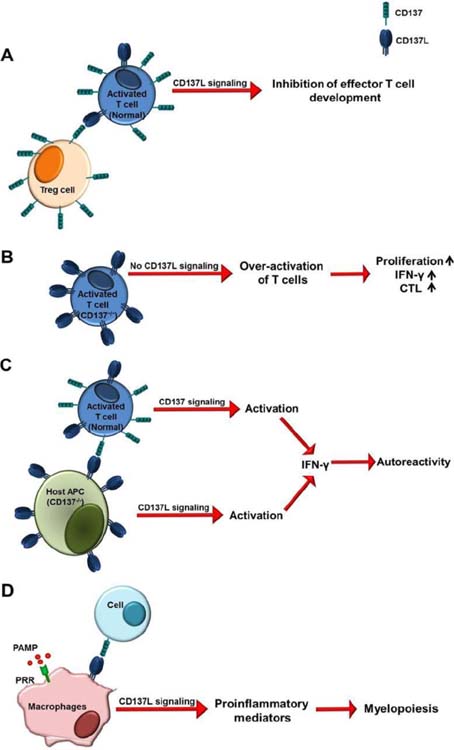Immune Netw.
2015 Jun;15(3):121-124. 10.4110/in.2015.15.3.121.
Is CD137 Ligand (CD137L) Signaling a Fine Tuner of Immune Responses?
- Affiliations
-
- 1School of Biological Sciences, University of Ulsan, Ulsan 680-749, Korea. bkwon@ulsan.ac.kr
- KMID: 2168037
- DOI: http://doi.org/10.4110/in.2015.15.3.121
Abstract
- Now, it has been being accepted that reverse signaling through CD137 ligand (CD137L) plays an important role in vivo during hematopoiesis and in immune regulation. However, due to technical difficulty in dissecting both directional signaling events simultaneously in vivo, most biological activities caused by CD137-CD137L interactions are considered as results from signaling events of the CD137 receptor. To make the story more complex, CD137-/- and CD137L-/- mice have increased or decreased immune responses in a context-dependent manner. In this Mini review, I will try to provide a plausible explanation for how CD137L signaling is controlled during immune responses.
Keyword
Figure
Reference
-
1. Croft M. The role of TNF superfamily members in T-cell function and diseases. Nat Rev Immunol. 2009; 9:271–285.
Article2. Shao Z, Schwarz H. CD137 ligand, a member of the tumor necrosis factor family, regulates immune responses via reverse signal transduction. J Leukoc Biol. 2011; 89:21–29.
Article3. Kwon B. Regulation of inflammation by bidirectional signaling through CD137 and its ligand. Immune Netw. 2012; 12:176–180.
Article4. Ho WT, Pang WL, Chong SM, Castella A, Al-Salam S, Tan TE, Moh MC, Koh LK, Gan SU, Cheng CK, Schwarz H. Expression of CD137 on Hodgkin and Reed-Sternberg cells inhibits T-cell activation by eliminating CD137 ligand expression. Cancer Res. 2013; 73:652–661.
Article5. Eun SY, Lee SW, Xu Y, Croft M. 4-1BB ligand signaling to T cells limits T cell activation. J Immunol. 2015; 194:134–141.
Article6. Quek BZ, Lim YC, Lin JH, Tan TE, Chan J, Biswas A, Schwarz H. CD137 enhances monocyte-ICAM-1 interactions in an E-selectin-dependent manner under flow conditions. Mol Immunol. 2010; 47:1839–1847.
Article7. Olofsson PS, Soderstrom LA, Wagsater D, Sheikine Y, Ocaya P, Lang F, Rabu C, Chen L, Rudling M, Aukrust P, Hedin U, Paulsson-Berne G, Sirsjo A, Hansson GK. CD137 is expressed in human atherosclerosis and promotes development of plaque inflammation in hypercholesterolemic mice. Circulation. 2008; 117:1292–1301.
Article8. Jeon HJ, Choi JH, Jung IH, Park JG, Lee MR, Lee MN, Kim B, Yoo JY, Jeong SJ, Kim DY, Park JE, Park HY, Kwack K, Choi BK, Kwon BS, Oh GT. CD137 (4-1BB) deficiency reduces atherosclerosis in hyperlipidemic mice. Circulation. 2010; 121:1124–1133.
Article9. Kim HJ, Lee JS, Kim JD, Cha HJ, Kim A, Lee SK, Lee SC, Kwon BS, Mittler RS, Cho HR, Kwon B. Reverse signaling through the costimulatory ligand CD137L in epithelial cells is essential for natural killer cell-mediated acute tissue inflammation. Proc Natl Acad Sci U S A. 2012; 109:E13–E22.
Article10. Kim HJ, Lee JS, Kim A, Koo S, Cha HJ, Han JA, Do Y, Kim KM, Kwon BS, Mittler RS, Cho HR, Kwon B. TLR2 signaling in tubular epithelial cells regulates NK cell recruitment in kidney ischemia-reperfusion injury. J Immunol. 2013; 191:2657–2664.
Article11. Fontana MF, Vance RE. Two signal models in innate immunity. Immunol Rev. 2011; 243:26–39.
Article12. Tang Q, Jiang D, Alonso S, Pant A, Martinez Gomez JM, Kemeny DM, Chen L, Schwarz H. CD137 ligand signaling enhances myelopoiesis during infections. Eur J Immunol. 2013; 43:1555–1567.
Article13. Lee SW, Park Y, So T, Kwon BS, Cheroutre H, Mittler RS, Croft M. Identification of regulatory functions for 4-1BB and 4-1BBL in myelopoiesis and the development of dendritic cells. Nat Immunol. 2008; 9:917–926.
Article14. Zhu G, Flies DB, Tamada K, Sun Y, Rodriguez M, Fu YX, Chen L. Progressive depletion of peripheral B lymphocytes in 4-1BB (CD137) ligand/I-Ealpha)-transgenic mice. J Immunol. 2001; 167:2671–2676.
Article15. Jiang D, Chen Y, Schwarz H. CD137 induces proliferation of murine hematopoietic progenitor cells and differentiation to macrophages. J Immunol. 2008; 181:3923–3932.
Article16. Jiang D, Yue PS, Drenkard D, Schwarz H. Induction of proliferation and monocytic differentiation of human CD34+ cells by CD137 ligand signaling. Stem Cells. 2008; 26:2372–2381.
Article17. Kang YJ, Kim SO, Shimada S, Otsuka M, Seit-Nebi A, Kwon BS, Watts TH, Han J. Cell surface 4-1BBL mediates sequential signaling pathways 'downstream' of TLR and is required for sustained TNF production in macrophages. Nat Immunol. 2007; 8:601–609.
Article18. Kwon BS, Hurtado JC, Lee ZH, Kwack KB, Seo SK, Choi BK, Koller BH, Wolisi G, Broxmeyer HE, Vinay DS. Immune responses in 4-1BB (CD137)-deficient mice. J Immunol. 2002; 168:5483–5490.
Article19. Lee SW, Vella AT, Kwon BS, Croft M. Enhanced CD4 T cell responsiveness in the absence of 4-1BB. J Immunol. 2005; 174:6803–6808.
Article20. Martinez Gomez JM, Chen L, Schwarz H, Karrasch T. CD137 facilitates the resolution of acute DSS-induced colonic inflammation in mice. PLoS One. 2013; 8:e73277.
Article
- Full Text Links
- Actions
-
Cited
- CITED
-
- Close
- Share
- Similar articles
-
- Regulation of Inflammation by Bidirectional Signaling through CD137 and Its Ligand
- CD137-CD137 Ligand Interactions in Inflammation
- Recombinant TAT-CD137 Ligand Cytoplasmic Domain Fusion Protein Induces the Production of IL-6 and TNF-alpha in Peritoneal Macrophages
- Integration of the Innate and Adaptive Immunity by CD137-CD137L Bidirectional Signals: Implications in Allograft Rejection
- Agonistic Anti-CD137 Monoclonal Antibody Treatment Induces CD11b+Gr-1+ Myeloid-derived Suppressor Cells


